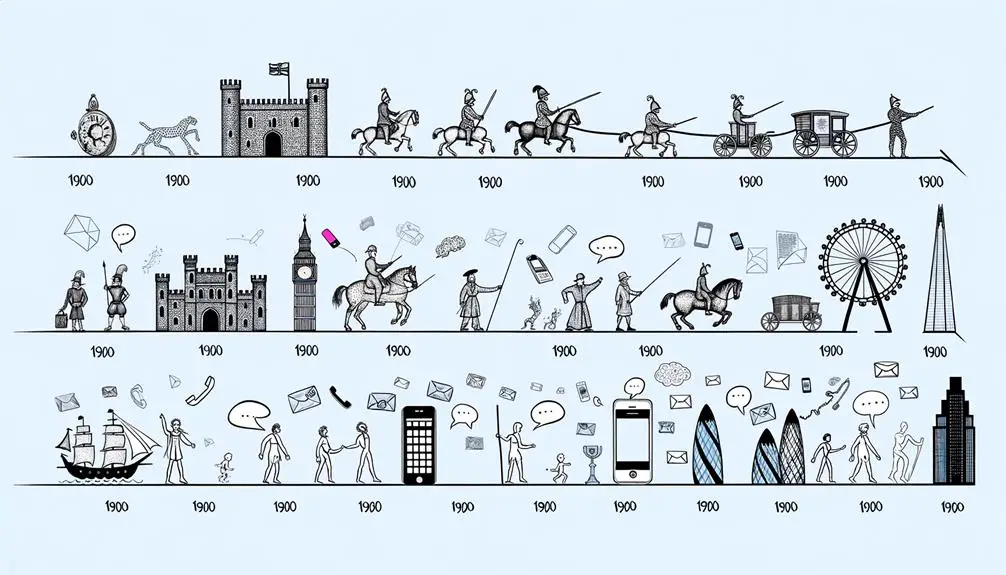In British slang, 'bollocks' has a rich heritage tracing back to Old English, signifying a transformation from a literal to a metaphorical lexicon. Originally linked to livestock, it's become a multifaceted term that articulates frustration, disbelief, or the notion of falsehood, depending on the context. Your exploration uncovers its versatility, reflecting its ability to convey emotional intensity or critique. This etymological journey reveals the word's adaptability, mirroring societal and cultural evolutions. The distinction between 'bullocks' and 'bollocks' is important, as the former is often a misinterpretation. Further exploration offers deeper insights into its nuanced meanings across various contexts.
Key Takeaways
- "Bullocks" is often confused with "bollocks," but typically refers to young bulls in British English.
- Unlike "bollocks," "bullocks" does not carry slang connotations related to frustration or falsehood.
- In slang, "bollocks" expresses disbelief or criticism, whereas "bullocks" remains a straightforward term in farming contexts.
- "Bullocks" lacks the varied emotional and critical uses found in the slang term "bollocks."
- The confusion between "bullocks" and "bollocks" highlights the importance of context in understanding British slang.
Origins and History

Delving into the origins and history of 'bollocks', it's evident that this term, deeply rooted in Middle English, has evolved considerably from its initial anatomical reference to become a multifaceted staple of British slang. Its journey through the ages is not only a portrayal of the dynamic nature of language but also highlights the cultural shifts that influence linguistic evolution.
The cattle connection is particularly significant in tracing the term's lineage. Originally denoting the testicles of a male animal, 'bollocks' has its etymological roots in the Old English word 'beallucas', which directly links to livestock and, by extension, to farming societies of early England. This agricultural association underscores the term's mundane, everyday origins, anchoring it in the lexicon of the common folk.
As the English language morphed through the centuries, so did the usage of 'bollocks'. The linguistic evolution it underwent is indicative of societal changes, moving from a purely anatomical reference to acquiring a broader, more nuanced range of meanings. This representation, documented in various historical texts and linguistic studies, illustrates the term's resilience and adaptability, marking it as a unique element of British slang that has stood the test of time.
Primary Meanings
In its contemporary form, 'bollocks' embodies a complex spectrum of meanings, ranging from expressions of frustration to markers of falsehood, that illustrate its profound versatility in the English language. This term's evolution, deeply embedded within the fabric of British slang, offers a fascinating glimpse into the dynamic interplay between linguistic innovation and cultural shifts. The primary bullocks definition, initially rooted in the vulgar, has transcended its crude origins to embrace a multitude of nuanced applications.
You'll find that, at its core, 'bollocks' can convey intense emotion, often serving as an expletive to express dismay or disbelief. However, its adaptability doesn't end there. The term also functions as a robust tool for dismissing statements as untrue or deceitful, embodying the skepticism with which individuals might approach certain claims or narratives. This duality underscores the term's capacity to navigate between the domains of emotional expression and critical evaluation.
Slang evolution, particularly in the case of 'bollocks', underscores the linguistic mechanism through which words accrue additional meanings over time. It's a confirmation of the vibrant, ever-changing nature of language, reflecting societal attitudes and the collective experiences of its speakers.
Contextual Uses

Having explored the primary meanings and evolution of 'bollocks' in British slang, it's now time to examine its contextual uses, revealing how this term operates within various social and communicative scenarios. The contextual deployment of 'bollocks' is nuanced, reflecting its adaptability and the depth of British linguistic creativity. This exploration into its usage illuminates not only the word's flexibility but also the cultural and regional nuances that influence its reception.
- Expression of Disbelief or Dismissal: You might use 'bollocks' to express strong disagreement or to dismiss someone's claim as false or nonsensical. This usage underscores the speaker's skepticism or frustration.
- Indicating Worthlessness: In some contexts, 'bollocks' can denote something that is deemed worthless or of no value, emphasizing the speaker's disdain or contempt.
- Conveying Frustration or Annoyance: You may hear 'bollocks' used as an exclamation of frustration or annoyance, highlighting a situation's perceived absurdity or the speaker's irritation.
- Celebratory Exclamation: Surprisingly, in certain modern interpretations and regional differences, 'bollocks' can also serve as an exclamation of joy or approval, albeit less commonly, showcasing its versatility in emotional expression.
This analysis, steering clear of variations and confusions, focuses on 'bollocks' as a dynamic element of British colloquial speech, reflecting both traditional roots and modern interpretations across various contexts.
Variations and Confusions
When delving into the nuanced terrain of 'bollocks' within British slang, it is important to tackle the variations and common confusions that arise, further complicating its interpretation and use. The term, deeply rooted in animal terminology, originally refers to the testicles of a male animal, often a bull. However, its slang usage diverges greatly across different contexts and regional dialects, leading to a rich tapestry of meanings that can perplex even the most avid linguaphiles.
To elucidate, consider the following table outlining key variations and sources of confusion:
| Variation/Confusion | Explanation |
|---|---|
| Bollocks vs Bullocks | While 'bollocks' pertains to slang, 'bullocks' are young bulls, showcasing the overlap with animal terminology. |
| The Dog's Bollocks | An idiom meaning 'the best', it exemplifies how positive connotations can emerge from seemingly negative roots. |
| Regional Dialects | Variance in pronunciation and usage across regions can alter meaning greatly, from insults to expressions of disbelief. |
| Balls vs Bollocks | Both can refer to testicles, but 'bollocks' has a broader slang application, including nonsense or falsehoods. |
| Bollocking | A verb form meaning to scold or reprimand, adding action to the noun's static nature. |
This exploration demonstrates the complexity and dynamic nature of 'bollocks' within British slang, underpinned by animal terminology and regional dialects, demanding a keen understanding to navigate its variations and avoid confusions.
Cultural Impact

Understanding the cultural impact of 'bollocks' in British slang requires an appreciation of how it's woven into the fabric of everyday communication, reflecting societal attitudes and values. The term's ubiquity and versatility underscore its significance within both colloquial speech and broader cultural narratives. Here are four key aspects illustrating its cultural resonance:
- Media Representation: 'Bollocks' frequently appears in British media, from iconic music albums to television, embodying a spirit of rebellion and authenticity. Its prevalence showcases the word's integration into the vernacular, symbolizing a bridge between mainstream and counter-cultural expressions.
- Social Acceptance: Despite its potentially offensive origins, the term has achieved a level of social acceptance, indicative of changing linguistic sensitivity and the dynamic nature of what is considered vulgar or acceptable in public discourse.
- Literary and Artistic Expression: Artists and writers often employ 'bollocks' to convey frustration, disbelief, or ridicule, leveraging its emotional weight to enhance the impact of their work.
- Linguistic Evolution: The shifting meanings and applications of 'bollocks' reflect broader trends in language evolution, where words accrue new connotations and uses over time, influenced by social, political, and cultural shifts.
Analyzing 'bollocks' within these contexts reveals its multifaceted role in shaping and reflecting cultural dialogue, underscoring the power of language as a tool for expression and identity.







